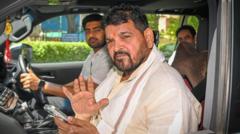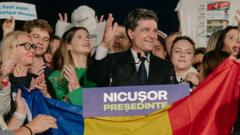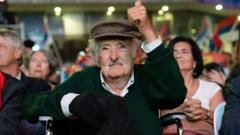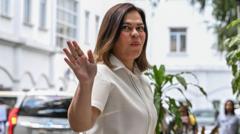Venezuela's electoral landscape remains tumultuous as the ruling party, led by Nicolás Maduro, celebrates a contentious victory in regional and parliamentary elections. The majority of opposition parties boycotted the polls amidst claims of electoral manipulation, leading to a fragile political atmosphere marked by widespread accusations of repression and intimidation.
Venezuela's Ruling Party Claims Landslide Victory Amid Opposition Boycott
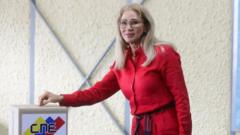
Venezuela's Ruling Party Claims Landslide Victory Amid Opposition Boycott
Venezuelan elections see ruling party assert control as opposition leaders question legitimacy and voter participation.
In the aftermath of regional and parliamentary elections, the ruling United Socialist Party of Venezuela (PSUV) has declared "an overwhelming victory," claiming to have secured 23 out of 24 gubernatorial positions and an absolute majority in the National Assembly. The electoral council, perceived as a tool of the government, reported a turnout of 42.6%, while opposition leader María Corina Machado disputed this figure, suggesting turnout was below 15% and calling the process a "farce."
The electoral process has been marred by controversy, including the recent repression of dissent and the detaining of over 70 opposition members prior to the election. Activists have condemned these actions as "state terrorism," asserting that they aim to silence opposition voices. Machado, who has been a vocal opponent of the Maduro regime, spearheaded the boycott of the elections, advocating that their results should be disregarded until allegations from the previous presidential election are addressed.
Despite a significant opposition boycott, some figures, including former presidential candidate Henrique Capriles, contested the elections, arguing that participating is an act of resistance. Yet their decision has drawn severe criticism from leaders like Machado, labeling it a betrayal of the broader opposition movement.
Amid these tensions, Maduro's party celebrated gains, retaining control over numerous states, including pivotal regions like Barinas. Following a reported wave of arrests targeting dissenting figures, the political atmosphere remains highly polarized. High-stakes territorial disputes continue to complicate matters, with Venezuela’s attempt to conduct elections in the disputed Essequibo region, administered by Guyana, drawing international condemnation.
As thousands of Venezuelans watch the unfolding political drama, the future remains uncertain amid fears of escalating repression and diminishing democratic processes.
The electoral process has been marred by controversy, including the recent repression of dissent and the detaining of over 70 opposition members prior to the election. Activists have condemned these actions as "state terrorism," asserting that they aim to silence opposition voices. Machado, who has been a vocal opponent of the Maduro regime, spearheaded the boycott of the elections, advocating that their results should be disregarded until allegations from the previous presidential election are addressed.
Despite a significant opposition boycott, some figures, including former presidential candidate Henrique Capriles, contested the elections, arguing that participating is an act of resistance. Yet their decision has drawn severe criticism from leaders like Machado, labeling it a betrayal of the broader opposition movement.
Amid these tensions, Maduro's party celebrated gains, retaining control over numerous states, including pivotal regions like Barinas. Following a reported wave of arrests targeting dissenting figures, the political atmosphere remains highly polarized. High-stakes territorial disputes continue to complicate matters, with Venezuela’s attempt to conduct elections in the disputed Essequibo region, administered by Guyana, drawing international condemnation.
As thousands of Venezuelans watch the unfolding political drama, the future remains uncertain amid fears of escalating repression and diminishing democratic processes.





